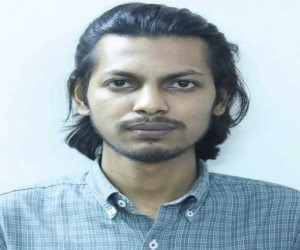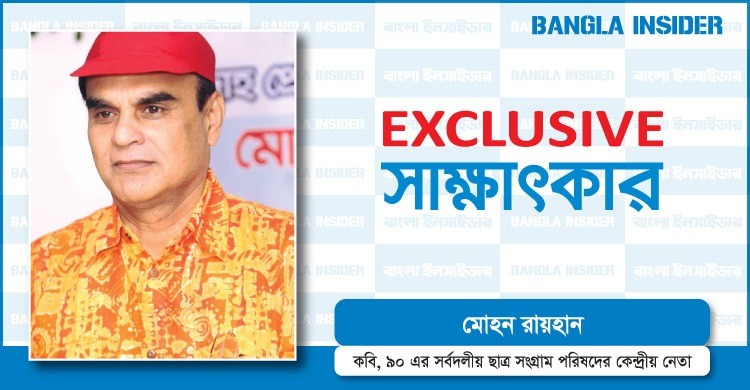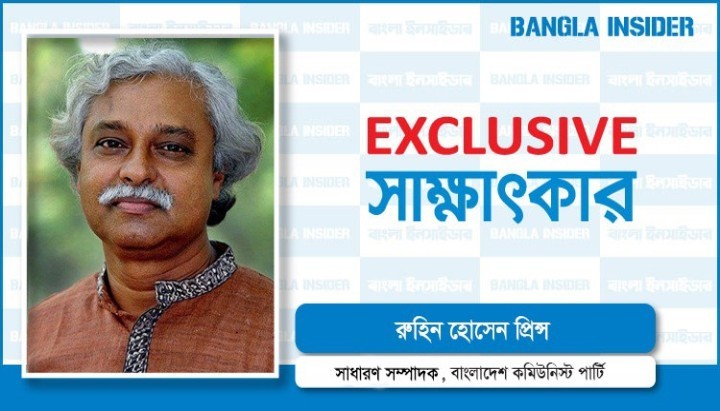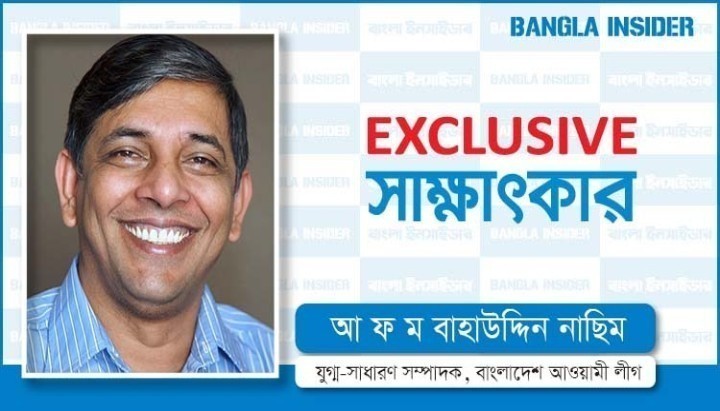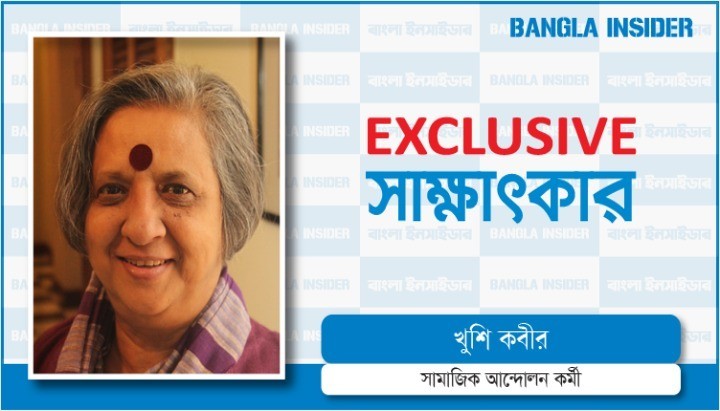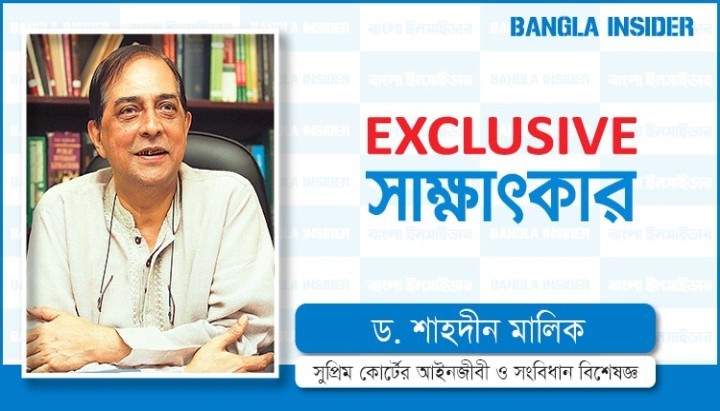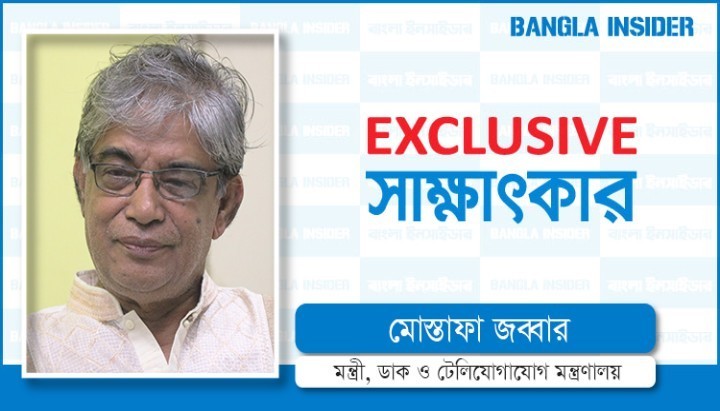Mohan
Raihan, a poet, writer, and a prominent student
leader of the 90s, is deeply connected to the struggle for national reformation
and subsequent resistance against military rule in post-independence
Bangladesh. Committed to societal change, he played a pivotal role. On March
24, 1982, when General Ershad imposed military rule in the country, it was
under Mohan Raihan's leadership that the first protest procession emerged from
Madhu's Canteen. On January 11, 1983, he also led the first student uprising
against military autocracy. In the turbulent 90s, this bold student leader
engaged in extensive discussions with Bangla Insider about contemporary politics.
The interview was conducted by the Staff Reporter Md. Oliul Islam.
Bangla Insider:
To understand the essence of the sacrifice of Noor Hossain, we want to ask:
Is it true that, through his self-sacrifice, the downfall of Ershad's military
dictatorship was made inevitable?
Mohan Raihan:
Today is November 10th, Noor Hossain Day. It has been declared a national day.
Noor Hossain made a sacrifice for the nation. Indeed, it was through his act of
self-sacrifice that the downfall of Ershad's military dictatorship became
inevitable.
Bangla Insider:
What were the intense desires of an autorickshaw driver like Noor towards
democracy? Could you shed some light on this?
Mohan Raihan:
Noor Hossain was an autorickshaw driver in his personal life. He carried the
slogan "Let Democracy Be Saved" on his chest and "Free
Democracy" on his back, walking the streets. This proves how intense the
democratic consciousness and aspirations of the common people were in the
democratic movement of Bangladesh. The active participation of ordinary
workers, farmers, rickshaw pullers, and laborers in all our democratic
movements, including the Language Movement of '52, the mass upsurge of '69, the
armed struggle of '71, and the anti-Ershad democratic movements, played an
essential role in pursuing/achieving success.
Bangla Insider:
The anti-Ershad democratic movement began under your leadership. Could you
tell us a bit more about that?
Mohan Raihan:
On March 24, 1982, Ershad unlawfully seized power. The very next day, under my
leadership, a procession of 15 to 20 students emerged from Dhaka University's
Madhu's Canteen. Simultaneously, under the leadership of Nurul Kabir, currently
the editor of the English daily New Age, another procession emerged with the
slogan "Reject Martial Law, Save Democracy." Towards the end of this
procession, when we returned to Madhu's Canteen, the top leaders of all student
organizations scorned us, labeled us as extremists, and quickly abandoned
Madhu's Canteen. Even my own organization, JASAD, and its leader, criticized
us. They said, "We haven't taken any decisions centrally, you have already
started a procession without any discussion. Do you think you can start a
movement just like that?" I replied that I've learned from politics;
martial law has been declared in the country, and we must protest. There's no
need for anyone's permission. Let's initiate the movement this way.
Bangla Insider:
Despite Majid Khan's educational policy, you and your group protested,
playing a role in the anti-military rule movement. Can you tell us more about
this?
Mohan Raihan:
Ershad not only illegally seized power but also declared an oppressive
education policy known nationwide as Majid Khan's education policy. We, the
students, protested against this policy and simultaneously initiated a movement
against military rule. We engaged in discussions with various student
organizations. On September 17, 1982, focusing on Education Day, we organized a
silent procession at the University of Dhaka. During that time, a few student
organizations collectively staged a silent procession in the Kalabhaban
courtyard of Dhaka University. Through this, the Student Struggle Council was
formed to prepare for an anti-military rule movement.
Bangla Insider:
How was the “Chhatra Sangram Parishad” formed?
Mohan Raihan:
On November 7, 1982, following the Civil Uprising of the masses, the Jatiya
Samajtantrik Dal student wing organized a mass procession. However, the police
invaded the university and subjected students, even teachers, to widespread
brutality. Students were beaten in classrooms, harassed, and repressed. During
this time, Nurul Alam Bapari, a teacher at Dhaka University, was brutally
assaulted in the name of punishment. Several prominent leaders of the Jatiya
Samajtantrik Dal student wing, including Sharif Khan, were seriously injured.
Taking this incident as the central point, we, the leaders of 14 student
organizations, united to form the Chhatra Sangram Parishad and declared a
nationwide plan to break the shackles of military rule on January 11.
Bangla Insider:
Your “Chhatra Sangram Parishad” faced opposition from major political
parties like Awami League and BNP when you tried to conduct activities under
its banner. What was the reason for this?
Mohan Raihan:
We adopted a Mass signature
campaign as part of our
extensive preparations against Majid Khan’s education policy. We successfully
educated hundreds of thousands of students within a month. On January 11, we
officially announced our plan to break military rule, leading a peaceful
procession from Dhaka University to Shahid Minar, a call that alarmed the
martial government. Political parties such as Awami League, BNP, leaders like
Sheikh Hasina, and Khaleda Zia told student leaders, “We are not ready.
Withdraw your plan.” Finally, it was decided that on January 11, the student
procession would go up to Shahid Minar, and they wouldn't enter the educational
institutions. However, ordinary students didn't heed this warning. On January
11, 1982, only 28 leaders from 14 student organizations led the procession to
Shahid Minar, while leaders and activists from all organizations surrounded the
educational institutions. We officially broke military rule through a peaceful
procession. Looking back, everyone writes about that day. On that day, we all
successfully shattered military rule peacefully, bringing a peaceful procession
back to the university. Despite the readiness of the martial government with
military forces, the courage to fire bullets into a gathering of students and
widespread student opposition, they did not dare to open fire. That day,
regular students broke into the DUCSU Bhavan building, questioning why everyone
involved in all movements had become rebels. Subsequently, we, the leaders of
all student organizations, joined together to discuss our strategy and
formulated new plans for the movement.
Bangla Insider:
How did the events of February 14 impact the movement?
Mohan Raihan:
The one-month preparation for the February 14 program followed the January 11
plan. We were once again prepared for February 14, and we disseminated
information throughout the country. On February 14, students of the Chhatra
Sangram Parishad gathered at the Shahid Minar, defying martial law. However,
the procession towards the educational institution was stopped in front of the
Shishu Academy as per Ershad's orders. Shots were fired, resulting in the
deaths of Jafar, Joynal, Kanchan, and Mozammel, among many other students. They
took away Joynal's body, surrounded the university, arrested many students, and
subjected them to torture, causing the university to close down. Some days
later, when the university reopened, we once again prepared for the movement.
As part of our preparations, we called for various strikes, took various
measures, and engaged in extensive promotion throughout all schools and
colleges across Bangladesh. During the movement, student leaders Shahjahan
Siraj of Rajshahi University was shot and killed during a labor strike, and
Tajul Islam, a leader of the Communist Party, was also assassinated. Later,
Rohan, a leader of the National Student League, was shot dead. We organized
massive demonstrations in Dhaka, which saw the participation of cultural
activists, writers, poets, intellectuals, workers, and ordinary citizens who
gradually joined our movement.
Bangla Insider:
How did the final days of Ershad's autocratic rule unfold?
Mohan Raihan:
As the protest gained momentum, the repressive regime became even more ruthless
and authoritarian. On November 10, 1987, they assassinated Nur Hossen by
gunfire, which further intensified the protests. In response to this brutal
murder, various political parties called for a nationwide dawn-to-dusk strike
on November 11 and 12. The movement gained even more momentum, culminating in
widespread public outrage and uprisings on December 6, leading to the downfall
of Ershad's autocracy. The era of Ershad's autocratic rule came to a gruesome
end after nearly a decade.
Bangla Insider:
Are we giving back enough for all the sacrifices made?
Mohan Raihan:
Are we really achieving the dreams of our martyrs, who sacrificed so much blood
and life for our liberation war, today? Sadly, the answer is no. The dreams our
martyrs had, the struggle we waged, the sacrifices we endured, the arrests we
faced, and the oppression we tolerated – have we truly achieved the democratic,
non-discriminatory Bangladesh they envisioned?
Bangla Insider:
How do you see the state of our democracy today, from your perspective?
Mohan Raihan:
Today, do we have the right to speak our minds in this country? Is the
integrity of our elections guaranteed today? Our entire nation has fallen into
a pit of corruption, lawlessness, and a climate of fear. Our parliament is now
dominated by businessmen, and many of them are involved in corruption. The
common people are suffering due to skyrocketing prices. Religious extremism and
communal violence are rampant. Where is the Bangladesh of our liberation war
today?
Bangla Insider:
Will the sacrifices of Nur Hossen and others go in vain?
Mohan Raihan:
Naturally, today we ask whether the sacrifices of Nur Hossen and others will go
in vain. This question should be asked by every one of us. If we remain silent,
if we become indifferent today, then it will not work. If we close our eyes to
the atrocities happening in this country, it will not work. I don't understand
how Sheikh Hasina can remain silent when the country is plagued by corruption,
lawlessness, and a reign of fear. Doesn't she hear or see it?
Bangla Insider:
Why don't we see you actively involved in current politics?
Mohan Raihan:
I have distanced myself from politics because the principles, policies, and
character that defined politics in our time are no longer present. Today,
politics is in the hands of politicians. Today, journalism is in the hands of
the media mafia. The media, including newspapers, radio, and television, is
controlled by the mafia. The journalists whom I respected, loved, and admired
in the past no longer exist. It saddens me deeply. Today, November 10th is Nur
Hossen Day. Nur Hossen was an auto-rickshaw driver. He gave his life today.
What did he want in his life? We need to think about this anew today. We need
to speak up again today. Those of us who believed in the cause of independence,
who participated in the liberation war, who sacrificed and suffered for it –
now it's our responsibility to revive that spirit. For the establishment of
democracy, for the values of the liberation war – equality, social justice, the
rule of law – we need to take a fresh oath on November 10th, Nur Hossen Day. We
need to unite with new determination.
Bangla Insider:
Do you have a message for the youth of today’s society?
Mohan Raihan:
Today, the youth of the world need to rise against capitalism, imperialism,
autocracy, and fascism. They need to break free from the culture of
consumerism. The entire youth society has been indoctrinated into consumerism
today. They need to awaken their consciousness against this. It's a dangerous
aspect of our society. The youth of this country are now passive. The male and
female students at Dhaka University don't think about it; they are silent about
everything. This is a well-thought-out conspiracy, a part of the plan. Today,
the youth society, the student society, has been made devoid of conscience. I
believe this is an integral part of the conspiracy to make the entire nation
apathetic and to divert their attention from critical issues.

